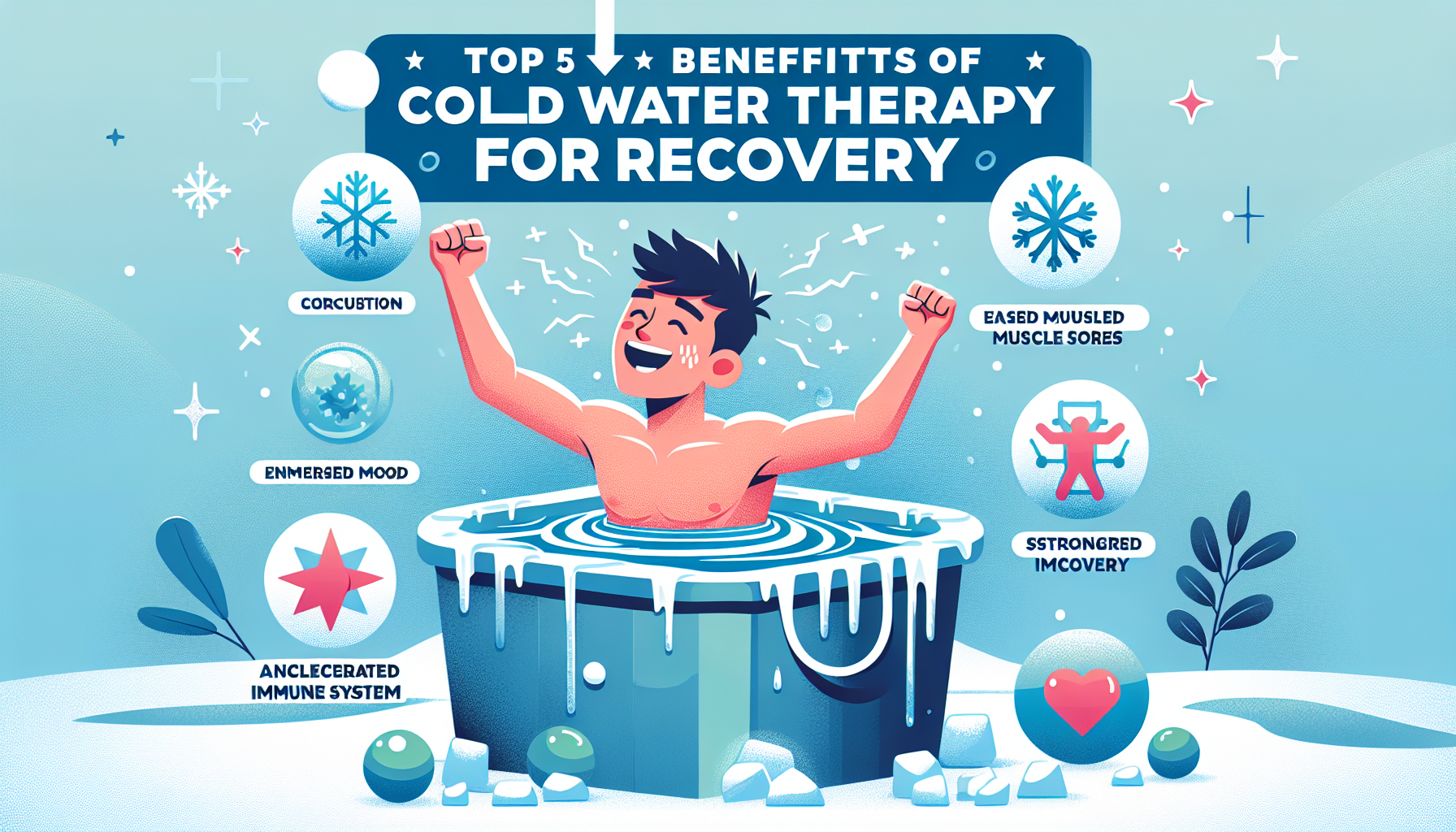Cold water therapy, often referred to as cold therapy or cryotherapy, is gaining popularity among athletes and fitness enthusiasts as a powerful recovery tool. With its roots in ancient practices, this method involves exposing the body to cold temperatures to stimulate various physiological responses. Let’s explore the top five benefits of cold water therapy for recovery.

1. Reduces Inflammation and Swelling
One of the primary benefits of cold water therapy is its effectiveness in reducing inflammation and swelling. When we engage in intense physical activities, our muscles can experience micro-tears, leading to inflammation. Cold exposure constricts blood vessels, which helps to minimize swelling and reduces the metabolic rate of cells. This process not only alleviates pain but also speeds up the recovery process by preventing excessive inflammation.
How It Works:
Cold water therapy lowers the temperature of the affected area, which leads to vasoconstriction. Once you emerge from the cold, your body warms up, and blood flow increases, facilitating the removal of metabolic waste and delivering essential nutrients to the damaged tissues. This cycle of constriction and dilation can significantly reduce recovery time.
2. Alleviates Muscle Soreness
Delayed Onset Muscle Soreness (DOMS) is a common issue faced by athletes after intense workouts. Cold water therapy has been shown to be effective in alleviating the soreness associated with DOMS. Immersing the body in cold water can dull nerve endings, providing immediate pain relief. This is particularly beneficial for those who train frequently and need to recover quickly between sessions.
Research Insight:
Studies have indicated that athletes who use cold water immersion after intense workouts report lower levels of muscle soreness in the days following their training sessions compared to those who do not use this recovery method. This ability to reduce soreness can encourage athletes to maintain their training schedules without prolonged discomfort.
3. Enhances Circulation
While cold water therapy initially constricts blood vessels, the subsequent rewarming phase leads to vasodilation, which enhances circulation. Improved blood flow is essential for recovery, as it delivers oxygen and nutrients to muscles while removing waste products like lactic acid. This dual action of constriction and dilation can significantly enhance the body’s natural recovery processes.
Long-Term Benefits:
Regular cold water therapy can lead to improved cardiovascular health and increased overall circulation. Enhanced circulation not only aids in recovery but also contributes to better overall physical performance, as muscles become more efficient at utilizing oxygen and nutrients.
4. Boosts Mood and Mental Resilience
Cold water therapy is not only beneficial for physical recovery but also for mental health. The shock of cold water can trigger the release of endorphins, the body’s natural painkillers, which can lead to an improved mood. Additionally, many individuals report experiencing a sense of euphoria or a “high” after cold water exposure, which can be attributed to the release of neurotransmitters.
Mental Toughness:
Participating in cold water therapy can also enhance mental resilience. The practice requires a degree of mental fortitude, as the initial discomfort can be challenging. Over time, individuals who regularly engage in cold water therapy often find that they become more adept at managing stress and discomfort, both physically and mentally. This increased resilience can translate to improved performance in sports and overall life challenges.
5. Supports Immune Function
Emerging research suggests that cold water therapy may have a positive effect on the immune system. Regular exposure to cold temperatures can stimulate the production of white blood cells, which help the body fight off infections. This is particularly beneficial for athletes, as intense training can sometimes lead to a temporary decrease in immune function.
Evidence of Immunity Boost:
A study conducted in the Netherlands indicated that individuals who regularly practiced cold exposure had a lower incidence of respiratory infections compared to those who did not. By incorporating cold water therapy into recovery routines, athletes may not only enhance their physical recovery but also bolster their immune defenses.
Conclusion
Cold water therapy is a powerful tool for recovery, offering a multitude of benefits that can enhance athletic performance and overall well-being. From reducing inflammation and alleviating soreness to boosting mood and supporting immune function, the advantages of this practice are compelling. As with any recovery method, it’s essential to listen to your body and consult with a healthcare professional if you have any concerns.
Whether you’re an elite athlete or a weekend warrior, incorporating cold water therapy into your recovery strategy can pave the way for improved performance, faster recovery times, and a more resilient mindset. Embrace the chill and experience the transformative effects of cold water therapy for yourself!
AI-Assisted Content Disclaimer
This article was created with AI assistance and reviewed by a human for accuracy and clarity.





Leave a Reply